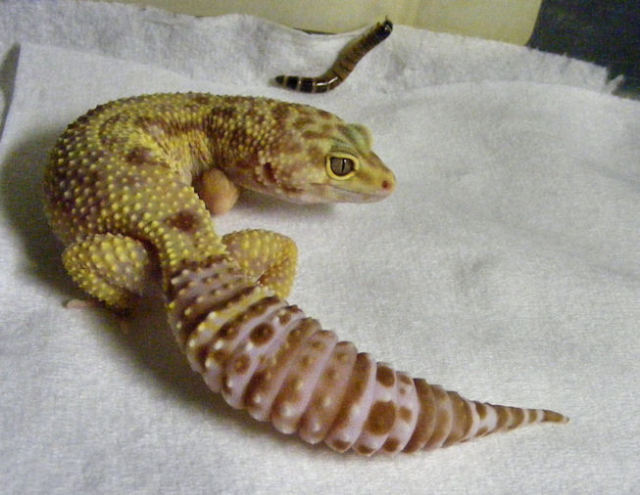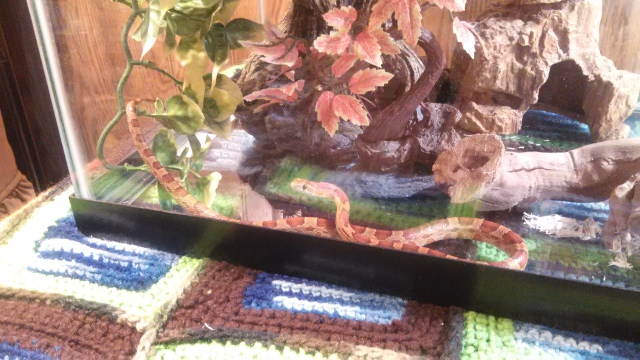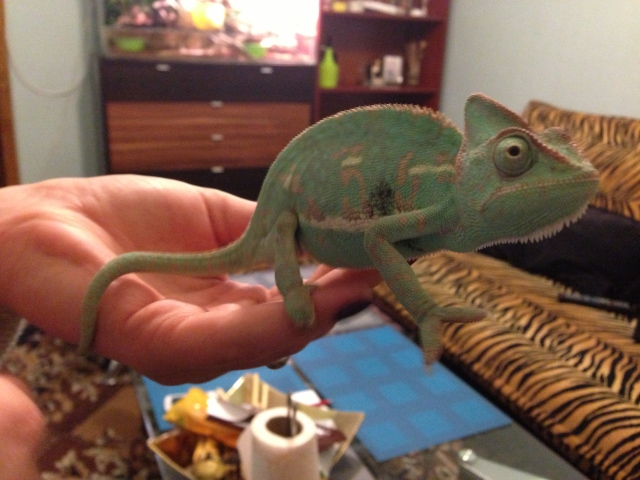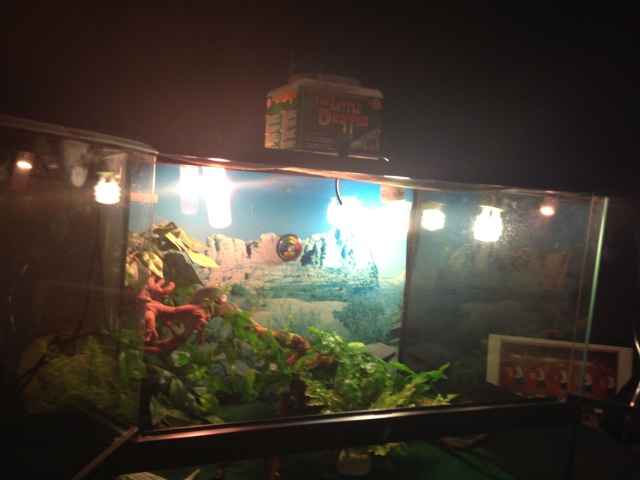QuestionWe have a painted turtle (daughter caught when a baby - now approx 4 inches in diameter) We bought a UVB light (approximately $30) as well as a tank heater. The previous heater had stopped working and the temperature in the house had gone down to approximatley 60 degrees (approximately 4 weeks ago). At the same time my daughter had "rescued" two crayfish from a bait and tackle shop (you can't release them in the wild) and added them to the tank with the turtle. Approximately 4 weeks is when the turtle stopped eating - He used to eat live worms, flies, and we have the dried worms plus 3 different diet supplements (which he used to eat) and I just bought him a bag of somewhat wetter food that has all the supplements he is supposed to need (Petco). His eyes have also in the last week stayed pretty much closed. I looked online about that and there is no pus or puffiness - and not whitish colored growth on the shell - The only thing I could come up with is that he has a Vitamin A deficiency (I also talked to a girl who works at the Humane Society in the wildlife rehab and that is what she suggested - as well as it being possible that he is in hibernation). I have tried rubbing Vitamin A oil on his eyes (they suggested it might be absorbed by the skin) but he just won't eat. When I pet his shell or pick him up he gets quite aggitated and moves but when I put him back in his aquarium he just stays there. If it is hibernation, how can I get him to come out of it (as I have read that it is rather detrimental for him to be in that state of hibernation becuase his body is somewhere half in between). Thanks.
AnswerThis is somewhat confusing, but I will try to wade through it. Why do you say you can't release crayfish into the wild? They live in the wild. Unless you live in a very northerly state, or the desert SW, I don't see why not. They do quite well in many areas near lakes and streams.
For many reasons I do not recommend reptiles as pets for children. I also frown upon capturing them from the wild to take as pets, because it usually works out fatally for the reptile far sooner than it should.
You did not tell me what size tank you have, so I'm assuming it's smaller than necessary. You also did not mention tank filtration, so I'm going to have to assume you don't have filters...which is an absolute NO-NO if you are keeping a water turtle. This, along with putting crayfish in there with him in a tank that is probably too small for him, along with not getting him another working tank heater for a month if I understand you right, could lead to serious problems. I'm also under the impression that the turtle stopped eating 4 weeks ago? If that's true, this should have been addressed at a vet before now.
Temperature is critical, filtration is critical, and it's critical that you not put other animals in there of questionable origin or that might not even be native where the turtle is native. Any of these things, or all these things, risk making him fatally ill.
All these "3" diet supplements you have been giving him might have done damage as well. Excessive supplementation ( hypervitaminosis ) can cause problems just as bad as a deficiency. The diet should not consist of ANY food from Petco other than LIVE food, or aquarium plants such as anacharis or seaweed. A wild turtle needs a diet that does not come in a can. It needs some plant material, and fresh worms, crickets, etc. Processed or canned foods sold at pet stores are unhealthy as a primary food source for reptiles. Fish food or pellets can be given on occasion as supplementation if needed.
Stop medicating him yourself on some hunch, or advice from someone at the Humane Society. Vitamin A hypovitaminosis is very rare in fact, and many turtles are killed or injured by people giving excess Vitamin A when it is not warranted. You can cause his skin and shell scutes to slough off or do serious kidney and liver damage that way. A vitamin deficiency needs to be confirmed by blood work by a vet. You need to take him to a vet if you want to do the responsible thing. There are just far too many things that could be causing this condition and most times when a turtle is sick they don't have the time for you to learn as you go.
What I can tell you until you get to a vet: is to get a tank heater if you don't have one, make sure there is a dry basking area, remove the crayfish to a different container, get an aquarium filter, get the water above 70F and the basking area under the UV lamp to about 95, lay off the vitamins and supplements, get back on a healthy more natural diet, get a tank of at least 30 or more gallons if you don't have one already, or if you do drain and clean the tank and substrate, replace with fresh filtered or conditioned water, add a bacteriostatic sulfa block available at the pet store, and make a vet appointment because since this is a wild turtle it could also have parasites or a communicable pathogen and it may need antiparasitics, systemic antibiotics, or tube feeding to survive. Reptile veterinary medicine is still a difficult fluid science for many veterinarians. Do not attempt veterinary medicine if you don't know what you are doing. More often than not you will kill the reptile trying things people tell you on the internet. A volunteer at the Humane Society is also seldom going to be very well versed in reptile medicine.
http://anapsid.org/mainchelonians.html

 My Leopard Geckos Strange Dietary Habits
QuestionQUESTION: This is my first reptile pet, and I h
My Leopard Geckos Strange Dietary Habits
QuestionQUESTION: This is my first reptile pet, and I h
 Corn snake
Question
Munky
I just adopted a corn snake almo
Corn snake
Question
Munky
I just adopted a corn snake almo
 chameleon has developed a black spot on its side
Question
Black spot Black spot close up
sp
chameleon has developed a black spot on its side
Question
Black spot Black spot close up
sp
 Mystery Geckoe
Question
M
I have this picture my friend sent me of wha
Mystery Geckoe
Question
M
I have this picture my friend sent me of wha
 Yemen/veiled chameleon
Question
The tank The chameleon itself
Hi
Yemen/veiled chameleon
Question
The tank The chameleon itself
Hi